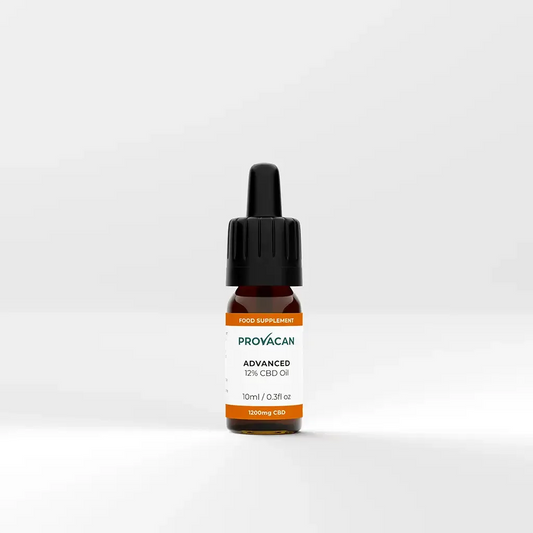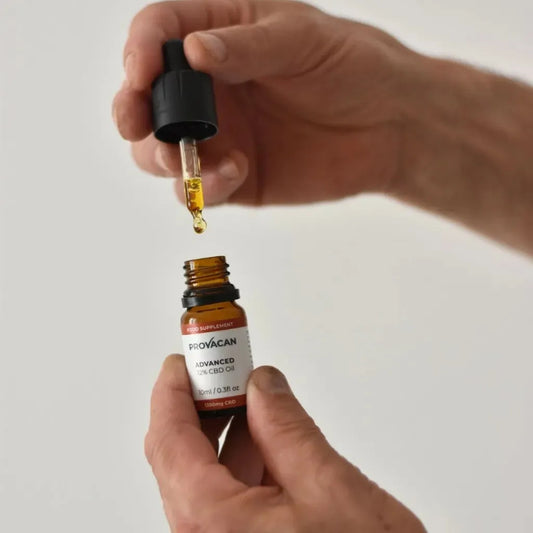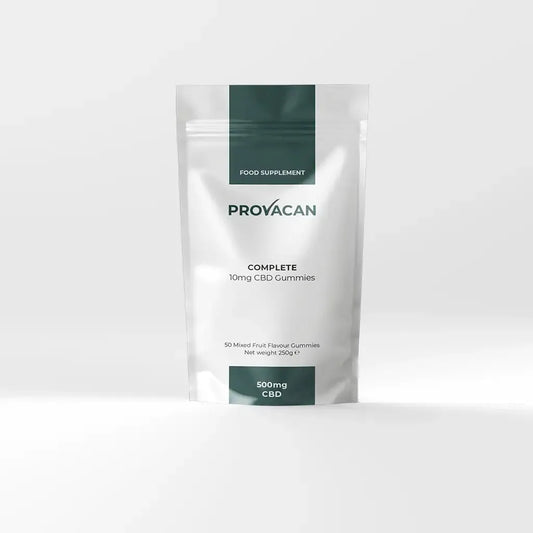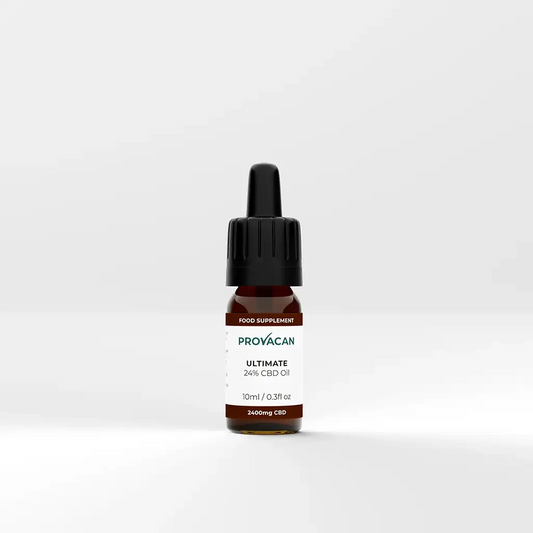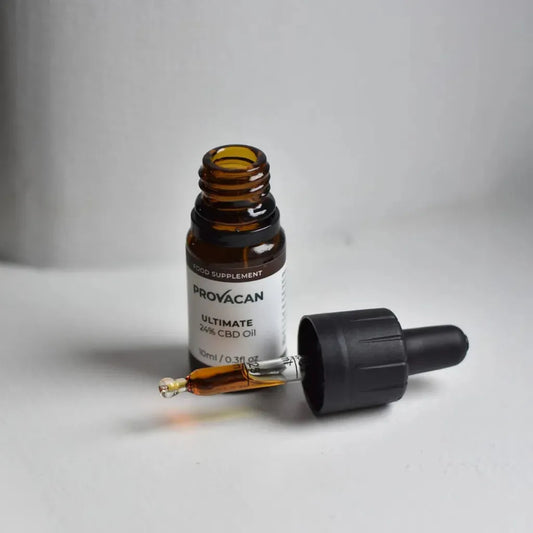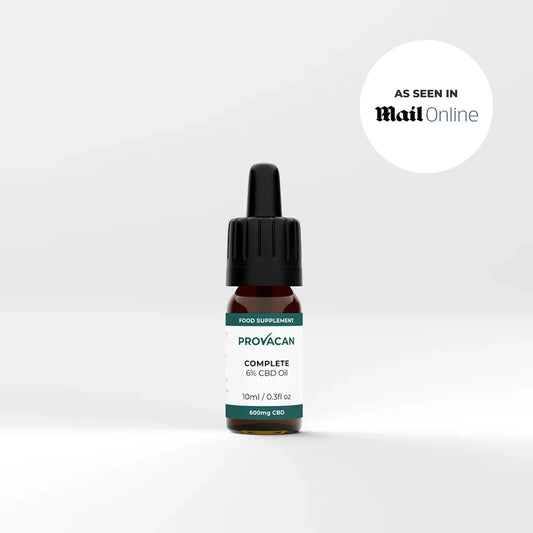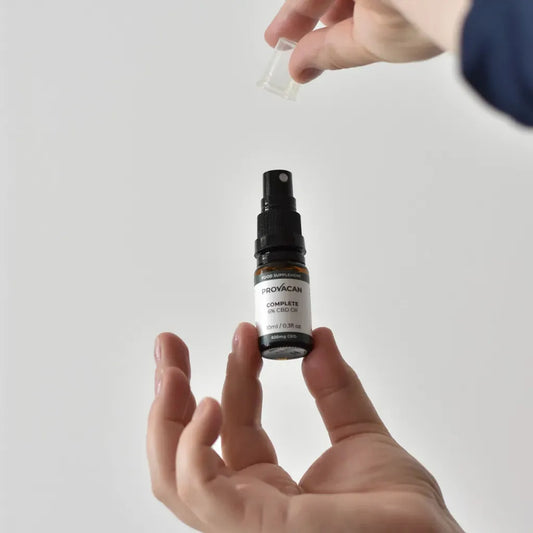Key Takeaways:
- HHC vs CBD: HHC offers milder psychoactive effects and greater stability, while CBD is non-psychoactive and promotes overall well-being.
- Legal Status: CBD is legal in the UK with specific regulations, while HHC's legality is ambiguous and requires careful monitoring of local laws.
- Choosing the Right Product: Consider personal wellness goals—HHC for mild euphoria and relaxation, CBD for stress relief and balance—when selecting between the two.
Understanding HHC
Hexahydrocannabinol (HHC) is an emerging compound in the cannabinoid family that has been gaining attention in the wellness community. HHC is a hydrogenated form of THC, the psychoactive compound found in cannabis. By adding hydrogen atoms, the chemical structure of HHC is altered, which in turn modifies its effects on the body. This hydrogenation process makes HHC more stable and potentially enhances its shelf life compared to THC. Unlike THC, which is often associated with intense psychoactive effects, HHC is reported to produce a milder, more balanced experience.
HHC is derived from hemp, making it a legal alternative to THC in many regions, including the UK. Users often seek out HHC for its potential relaxing and mildly euphoric effects, which are similar to but less potent than those of THC. This makes HHC a popular choice for individuals who are looking to explore cannabinoid products without the strong high associated with traditional THC. Additionally, HHC's unique properties are believed to offer therapeutic benefits, although research is still ongoing to fully understand its potential.
Understanding CBD
Cannabidiol (CBD) is one of the most well-known cannabinoids found in the hemp plant. Unlike THC, CBD is non-psychoactive, meaning it does not produce a "high." CBD interacts with the body's endocannabinoid system, which plays a role in regulating various physiological processes. This interaction contributes to a sense of balance and well-being. Due to its non-intoxicating nature, CBD has become popular among those seeking potential benefits without the psychoactive effects associated with THC.
CBD supports various wellness goals, including stress relief and promoting relaxation. Many users also report benefits for sleep quality and overall well-being. However, it's important to note that research is ongoing, and individual experiences vary. As with all health-related products, it's advisable to consult with a healthcare professional before starting any new supplement regimen. For high-quality CBD products that you can trust, explore Provacan's range to find the perfect fit for your wellness needs.
Chemical Composition: HHC vs. CBD
- HHC: Hexahydrocannabinol - HHC, or Hexahydrocannabinol, is a hydrogenated form of THC. The process of hydrogenation adds hydrogen atoms to the THC molecule, making it more stable and less prone to oxidation. This structural modification results in a compound that maintains some psychoactive properties but is generally less potent than THC. The added stability means HHC could have a longer shelf life compared to non-hydrogenated cannabinoids.
- CBD: Cannabidiol - CBD, or Cannabidiol, is one of the primary cannabinoids found in hemp. Unlike THC and HHC, CBD is non-psychoactive and does not produce a "high." Its chemical structure allows it to interact with the endocannabinoid system in a way that may promote balance and well-being without intoxicating effects. CBD's stability and non-psychoactive nature make it a popular choice for those seeking potential health benefits without the mind-altering effects of THC.
Effects And Benefits: HHC vs. CBD
Potential Effects And Benefits Of HHC
HHC, with its hydrogenated structure, is reported to produce milder psychoactive effects compared to THC. Users often seek HHC for its potential relaxing and mildly euphoric properties. These effects make HHC a suitable option for those looking for a less intense alternative to THC. Additionally, the stability of HHC could mean it retains its potency longer, offering sustained effects over time.
Potential Effects And Benefits Of CBD
CBD, known for its non-psychoactive properties, interacts with the endocannabinoid system in a way that promotes a sense of balance and well-being. Users often turn to CBD for its potential to alleviate stress and enhance relaxation. Some also report improvements in sleep quality and overall wellness. However, individual experiences vary. Ongoing research continues to explore its full range of benefits. Despite its popularity, it is important to consult with a healthcare professional before starting any new supplement regimen.
Potential Side Effects And Risks
Potential Side Effects Of HHC
HHC, though milder than THC, still produces some psychoactive effects. Users experience mild euphoria, relaxation, and changes in perception. Potential side effects include dry mouth, red eyes, and increased heart rate. Due to limited research, long-term effects of HHC are not well-documented, and individual reactions vary. It's important to approach HHC with caution and be mindful of how it affects your body. Consulting a healthcare professional before use is advisable.
Potential Side Effects Of CBD
CBD is generally well-tolerated, but some users experience side effects such as dry mouth, reduced appetite, or drowsiness. It's also important to note that CBD interacts with certain medications, so consulting a healthcare professional before use is recommended. Individual responses to CBD differ, and ongoing research aims to better understand its safety profile. Despite its popularity, caution is advised to ensure safe and effective use. Monitoring how your body reacts to CBD is essential for optimal results.
Legal Status In The UK
Legal Status Of HHC
HHC's legal status in the UK is somewhat ambiguous due to its relatively recent emergence in the market. As a derivative of THC, its legality depends on specific regulations and interpretations of existing cannabis laws. Unlike CBD, which has more established guidelines, HHC falls into a grey area, requiring consumers to stay informed about legislative updates. This lack of clear legal status means that the sale and use of HHC are subject to change as more research and legal scrutiny are applied. Staying informed about local laws and regulations is crucial for anyone considering HHC products. Vigilance in following legal developments ensures compliance and safety.
Legal Status Of CBD
CBD is legal in the UK provided it meets specific criteria, including being derived from EU-approved industrial hemp and containing less than 0.2% THC. The legal framework requires CBD products to be marketed as food supplements, and they must not make any medical claims. Compliance with these regulations ensures that CBD products are safe and reliable for consumers. Purchasing CBD from reputable sources is essential to ensure that products meet these legal standards and provide the expected benefits without legal complications. Consumers should always verify that their CBD products adhere to UK regulations to avoid any legal issues.
Choosing Between HHC And CBD
Factors To Consider
When choosing between HHC and CBD, consider your personal wellness goals and desired effects. HHC offers a milder psychoactive experience compared to THC, making it suitable for those seeking relaxation and mild euphoria without intense effects. Its stability and longer shelf life are also attractive features. In contrast, CBD is non-psychoactive and provides a sense of balance and well-being without any high. Understanding these differences helps in deciding which compound aligns best with your needs.
Personal Preferences And Needs
Think about what you're seeking from your cannabinoid experience. If you prefer a non-intoxicating option, CBD is a better choice, offering benefits like stress relief and relaxation without the psychoactive effects. For those looking for a less intense alternative to THC, HHC is a viable option, providing mild euphoria and relaxation. Consider how each product fits into your lifestyle and any specific health considerations. Consulting with a healthcare professional is essential to determine what’s best for your individual needs.
Read also:
- Is CBD Legal? Understanding Cannabidiol Legalisation
- Is CBD Addictive? The Effects Of CBD
- Top 10 Benefits Of CBD
Frequently Asked Questions About HHC Vs CBD
What is HHC?
HHC, or Hexahydrocannabinol, is a hydrogenated form of THC, created by adding hydrogen atoms to the THC molecule. This process makes HHC more stable and alters its effects on the body, resulting in milder psychoactive properties compared to THC. It is derived from hemp, making it a legal alternative to THC in many regions.
What is CBD?
CBD, or Cannabidiol, is a non-psychoactive cannabinoid found in hemp plants. Unlike THC, CBD does not produce a "high" and is known for its potential therapeutic benefits. It interacts with the body's endocannabinoid system, which helps regulate various physiological processes.
How does HHC differ from THC?
HHC is a hydrogenated version of THC, making it more stable and less prone to oxidation. This modification results in milder psychoactive effects compared to the intense high produced by THC. Additionally, HHC has a longer shelf life due to its increased stability.
Can HHC get you high?
HHC can produce mild euphoria and relaxation, but its effects are generally less intense than those of THC. Users often report a balanced, milder experience compared to THC. It is popular among those seeking the benefits of cannabinoids without the strong psychoactive effects.
Is CBD psychoactive?
No, CBD is non-psychoactive and does not produce a "high." It is known for its calming and balancing effects on the body without altering one's mental state. This makes it a popular choice for those seeking therapeutic benefits without intoxication.
What are the potential benefits of HHC?
HHC may offer relaxing and mildly euphoric effects, similar to but less potent than those of THC. Its unique properties also suggest potential therapeutic benefits, though research is still ongoing. Users appreciate HHC for its stability and longer shelf life.
What are the potential benefits of CBD?
CBD is known for promoting relaxation, reducing stress, and potentially improving sleep quality. It interacts with the endocannabinoid system to support various wellness goals. Individual experiences vary, and ongoing research continues to explore its full range of benefits.
Is HHC legal in the UK?
HHC's legal status in the UK is somewhat ambiguous due to its relatively recent emergence in the market. As a derivative of THC, its legality depends on specific regulations and interpretations of existing cannabis laws. Consumers should stay informed about legislative updates to ensure compliance.
Is CBD legal in the UK?
Yes, CBD is legal in the UK provided it meets specific criteria, including being derived from EU-approved industrial hemp and containing less than 0.2% THC. CBD products must be marketed as food supplements and must not make medical claims. Ensuring compliance with these regulations is essential for both sellers and consumers.
How should I choose between HHC and CBD?
Consider your personal wellness goals and desired effects when choosing between HHC and CBD. HHC offers a milder psychoactive experience, suitable for those seeking relaxation and mild euphoria. In contrast, CBD provides non-psychoactive benefits like stress relief and overall balance.
Sources:
- Graziano, S., Varì, M. R., Pichini, S., Busardo, F. P., Cassano, T., & Di Trana, A. (2023). Hexahydrocannabinol Pharmacology, Toxicology, and Analysis: The First Evidence for a Recent New Psychoactive Substance. Current Neuropharmacology, 21(12), 2424–2430. https://doi.org/10.2174/1570159X21666230623104624
- Atakan, Z. (2012). Cannabis, a complex plant: different compounds and different effects on individuals. Therapeutic Advances in Psychopharmacology, 2(6), 241–254. https://doi.org/10.1177/2045125312457586
- Sharma, P., Murthy, P., & Bharath, M. M. S. (2012). Chemistry, metabolism, and toxicology of cannabis: clinical implications. Iranian Journal of Psychiatry, 7(4), 149–156. https://www.ncbi.nlm.nih.gov/pmc/articles/PMC3570572/
- Martínez, V., Iriondo De-Hond, A., Borrelli, F., Capasso, R., del Castillo, M. D., & Abalo, R. (2020). Cannabidiol and Other Non-Psychoactive Cannabinoids for Prevention and Treatment of Gastrointestinal Disorders: Useful Nutraceuticals? International Journal of Molecular Sciences, 21(9). https://doi.org/10.3390/ijms21093067




